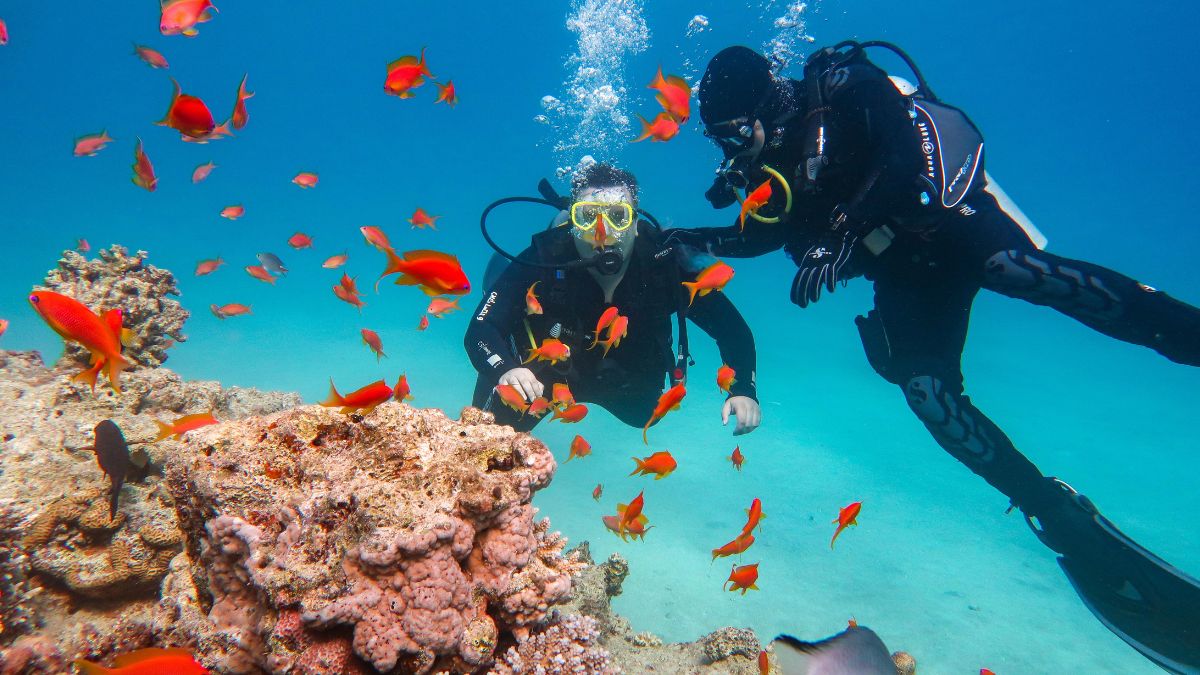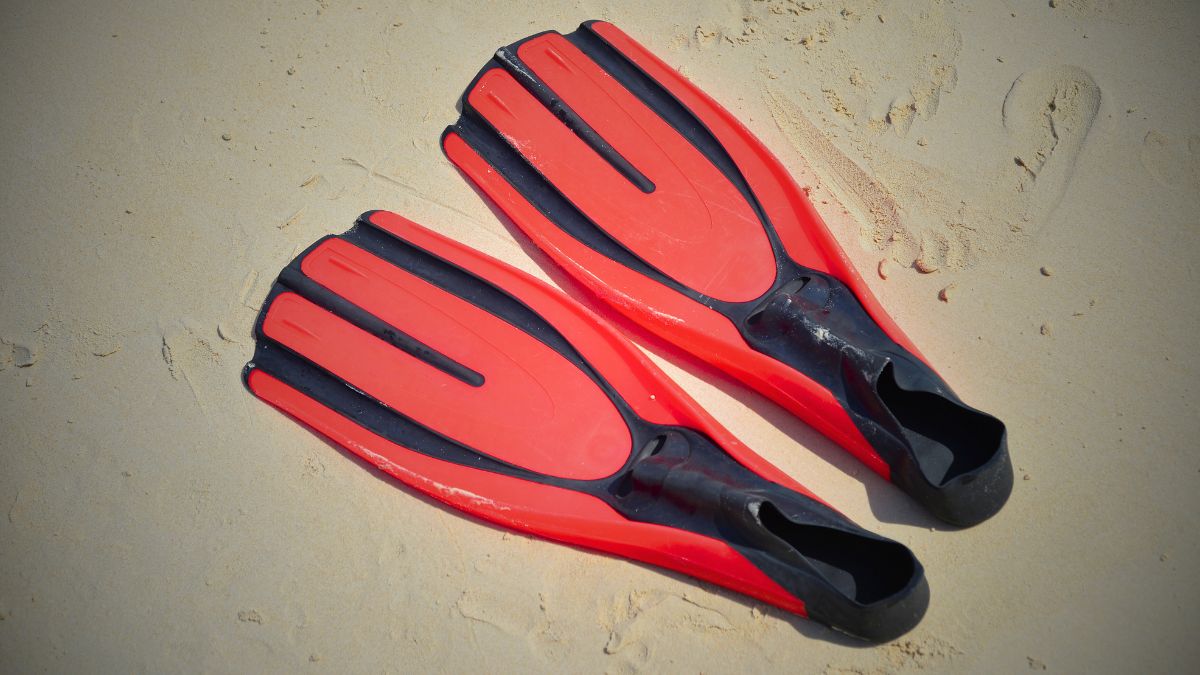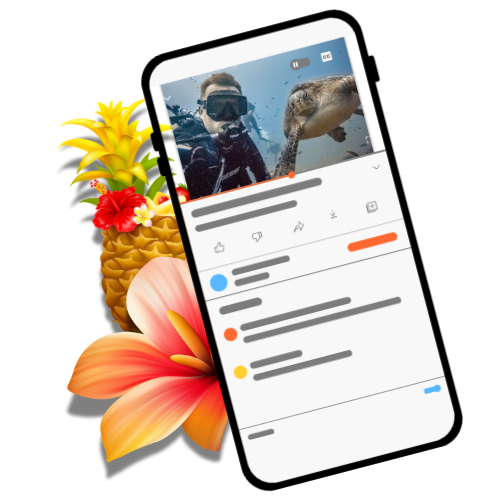Women’s health and diving is a topic that is often avoided and not fully covered. Yet women also dive and even break world diving records. However, there are certain aspects that every woman should pay attention to before jumping into the water.
Scuba diving is an increasingly popular recreational activity, and no wonder, because scuba diving is for everyone. Regardless of age and physical fitness. We have a lot of women divers at our dive center and we can’t leave out some aspects of diving for women. Today we will talk about these very issues.
Women’s Health and Scuba Diving
Let’s start with a small disclaimer, or excuse. How can I, as a man, know anything about women’s health and diving? I have been a dive instructor for many years and have had hundreds of women as clients on fundive, dive courses or expeditions. Many times I have heard questions and thus give advice on issues strictly female, but related to diving. This is the role of a good diving instructor. But just so you don’t think that my knowledge is only purely theoretical, my wife is not only a woman and a mother, but also a professional diver and underwater videographer with hundreds of hours spent underwater. That’s why we created this text together.
Scuba Diving and Pregnancy
This is probably the most serious topic when it comes to the health aspects of women and diving. Is it okay to dive during pregnancy? If you have any knowledge of scuba diving, you will certainly immediately shout NO! But… the answer is not so obvious. Every time I ask similar questions in my courses and the answer is always a categorical no. While the real answer should be – unfortunately, but we don’t know how diving can affect pregnancy and the fetus.
I say “unfortunately” because I would very much like to have hard answers backed by solid scientific research. This, however, will never happen, as it would require pressure tests on pregnant women and then confirmation or denial that the change has affected the fetus. With that said, do you understand how barbaric this idea is? So, we do not know whether the increased atomospheric pressure underwater, will in any negative way affect the pressure of the amniotic fluid and thus the fetus.
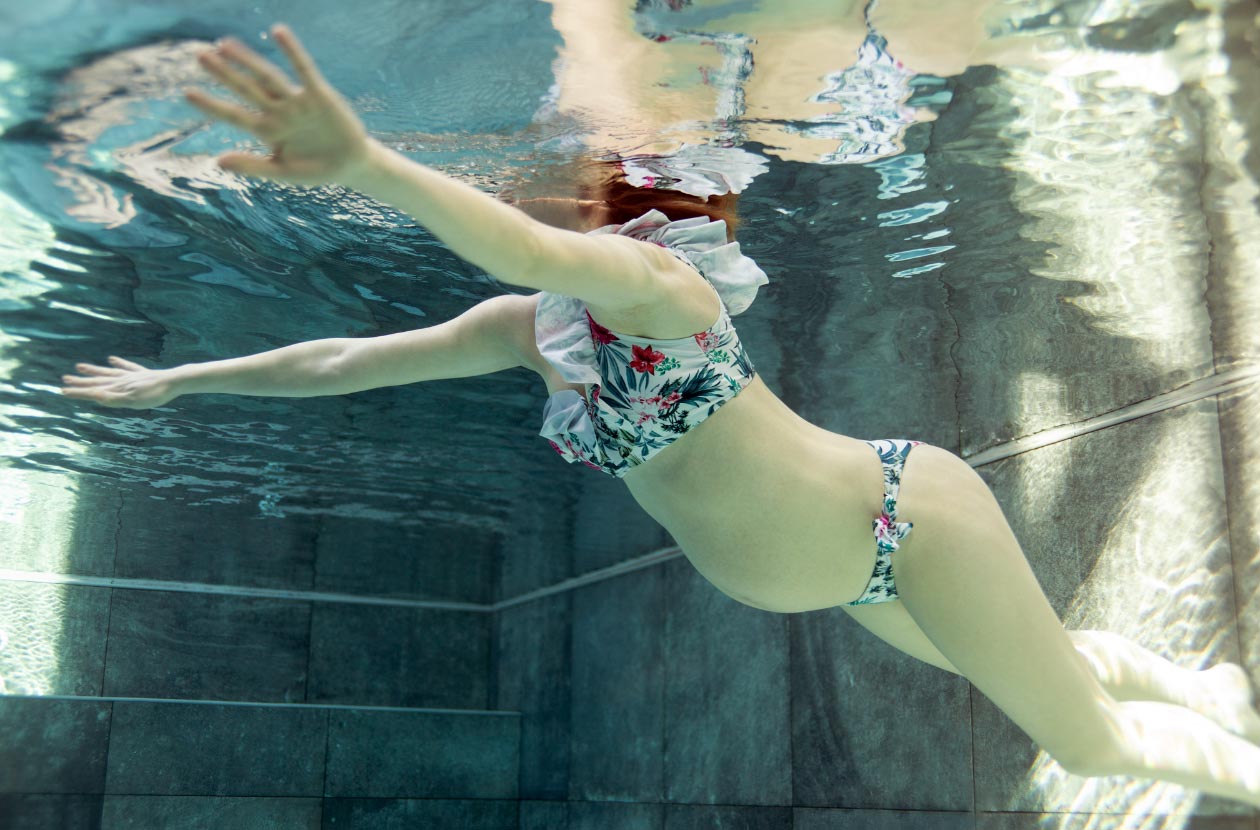
For this reason, we can’t take risks as a dive operator and you as a mother-to-be, and we can’t allow anyone who even suspects pregnancy to dive. But don’t worry, because there are other water activities that may be suitable for pregnant women, such as swimming or snorkeling in shallow waters. These activities do not involve the same pressure changes as diving and are generally considered safe for most pregnant women. However, it is still important to consult a doctor before engaging in any water activities during pregnancy.
You can find more information about scuba diving during pregnancy here: The Risks of Diving While Pregnant [pdf file]Scuba Diving and Breastfeeding
As we are on the topic of childbirth, another aspect related to women’s health and diving is breastfeeding. While scuba diving itself is generally considered safe for most individuals, there are specific considerations for breastfeeding women.
Firstly, it’s important to ensure that you have fully recovered from childbirth and have regained your strength and fitness before engaging in any physically demanding activities like scuba diving. Pregnancy and childbirth can have a significant impact on a woman’s body, and it’s crucial to give yourself enough time to heal and regain your strength before considering diving.
The primary concern with scuba diving while breastfeeding is the potential buildup of nitrogen in breast milk. Scuba diving involves breathing compressed air, which can result in nitrogen absorption in the body. Nitrogen can be transferred to breast milk, and while the effects on the nursing baby are not fully understood, it’s generally recommended to minimize any potential risks.
Wait for full desaturation
One important consideration is the timing of breastfeeding and diving. It’s generally recommended to wait a certain period of time after diving before breastfeeding. The exact timeframe may vary depending on factors such as the depth and duration of the dive, as well as the individual’s physiological factors. Different diving organizations and medical professionals may provide specific recommendations, but a common guideline is to wait at least 12 to 24 hours after completing a dive before breastfeeding. This allows enough time for any excess nitrogen to be eliminated from the body.
Remember, the safety and well-being of both you and your baby are of utmost importance. If you have any doubts or concerns about scuba diving while breastfeeding, it’s best to err on the side of caution and postpone diving until you have weaned your baby or have finished breastfeeding. Ultimately, it’s crucial to consult with your healthcare provider for personalized advice and guidance regarding scuba diving while breastfeeding. They can provide you with the most up-to-date information and help you make an informed decision that prioritizes the health and safety of both you and your baby.
Diving with Menstruation
Menstruation is a natural process where the lining of the uterus is shed each month. When it comes to menstruation and scuba diving, there are a few things to consider. Firstly, it’s important to note that menstruation itself does not prevent women from scuba diving. Many women continue to dive during their menstrual cycle without any issues. However, some women may experience discomfort, such as cramps or bloating, during this time. It’s important to listen to your body and assess whether you feel physically capable and comfortable diving during your period.
If you decide to dive while menstruating, there are a few practical considerations. Using tampons, menstrual cups, or other appropriate menstrual products is important to manage menstrual flow while underwater. It’s also a good idea to bring extra supplies and change them before and after diving to maintain hygiene and prevent leaks.
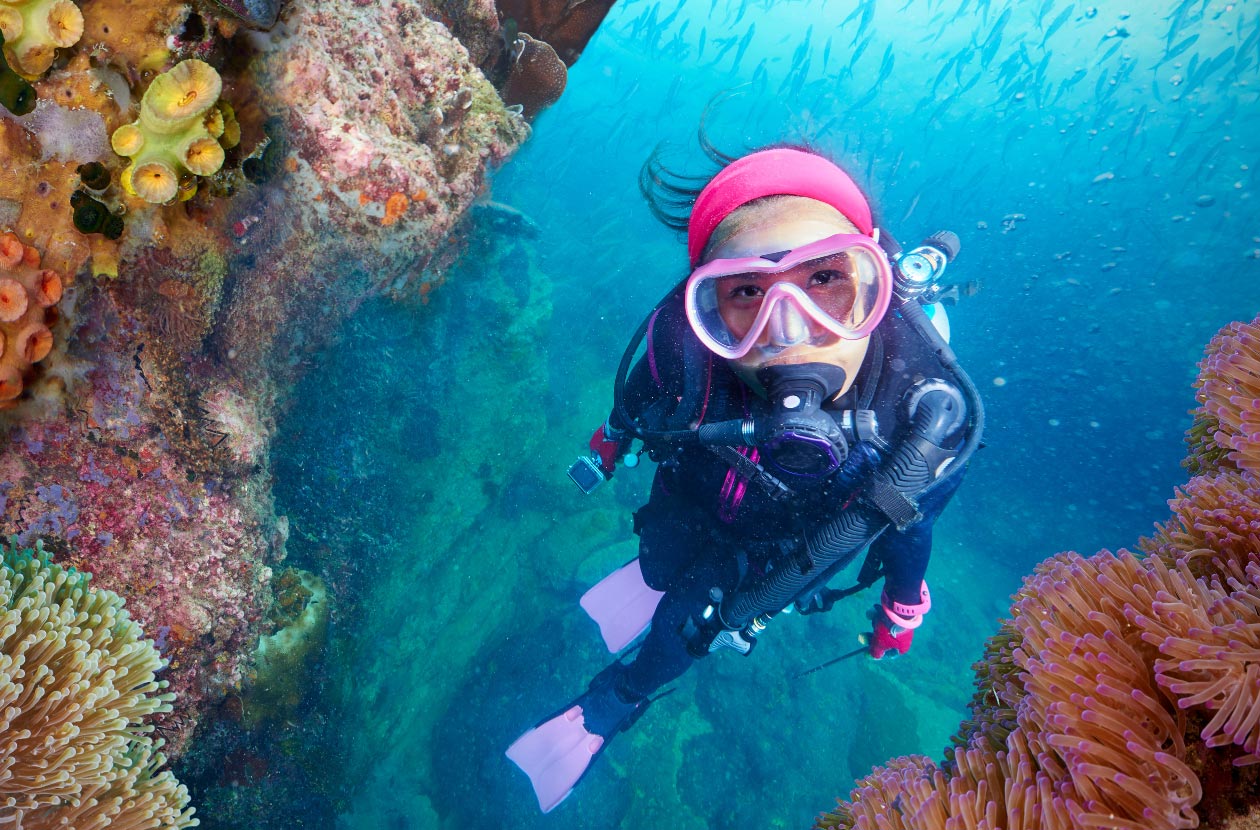
Some women may find that their menstrual cycle affects their mood or energy levels. It’s important to be aware of these potential changes and ensure that you feel mentally and emotionally prepared for diving. If you’re experiencing severe symptoms or discomfort during your period, it may be best to wait for a more comfortable time to dive. Ultimately, the decision to scuba dive while menstruating is a personal one. It’s important to be aware of your body’s needs and limitations, and to make choices that prioritize your comfort, safety, and enjoyment while diving. If you have any concerns or questions, it’s always a good idea to consult with a healthcare professional before diving.
Can a shark smell my menstrual blood?
This question is as serious as possible, and I am always glad when women have the courage to ask it directly. I have always believed that there are no stupid questions, there are only stupid answers. In the case of our dive center in Costa Rica, diving with sharks is actually a day-to-day thing. For female divers, especially with experience from areas that don’t abound with these beautiful animals, this question is sure to come up. So what’s it really like?
YES, the shark can detect your menstrual blood. Like all other human body fluids. NO, the shark will not attack you for that reason. In fact, it will not attack you for any other reason either.All the hoolywood movies that created the image of the killer shark are just movies…. Based on nonsense, misrepresentations or terrible stretching of facts. With the classic 1975 film “Jaws” at the forefront… (I actually love the film, but definitely not for the director’s excessive adherence to facts). Sharks have no taste for human flesh and that’s it, period.
Can I dive with breast implants?
Yes, it is generally safe to scuba dive with breast implants. After undergoing breast implant surgery, it is important to allow sufficient time for healing before engaging in any water activities, including diving. Consult with your plastic surgeon to determine the appropriate healing period for you. Regular check-ups with your surgeon will help ensure the implants are in good condition.
The increased pressure under water should not have a negative effect on the implant itself or your health. As long as the operation was performed properly and the wounds have had time to heal. From the point of view of gas absorption and overall diving safety, breast implants pose no problems or contraindications to diving.
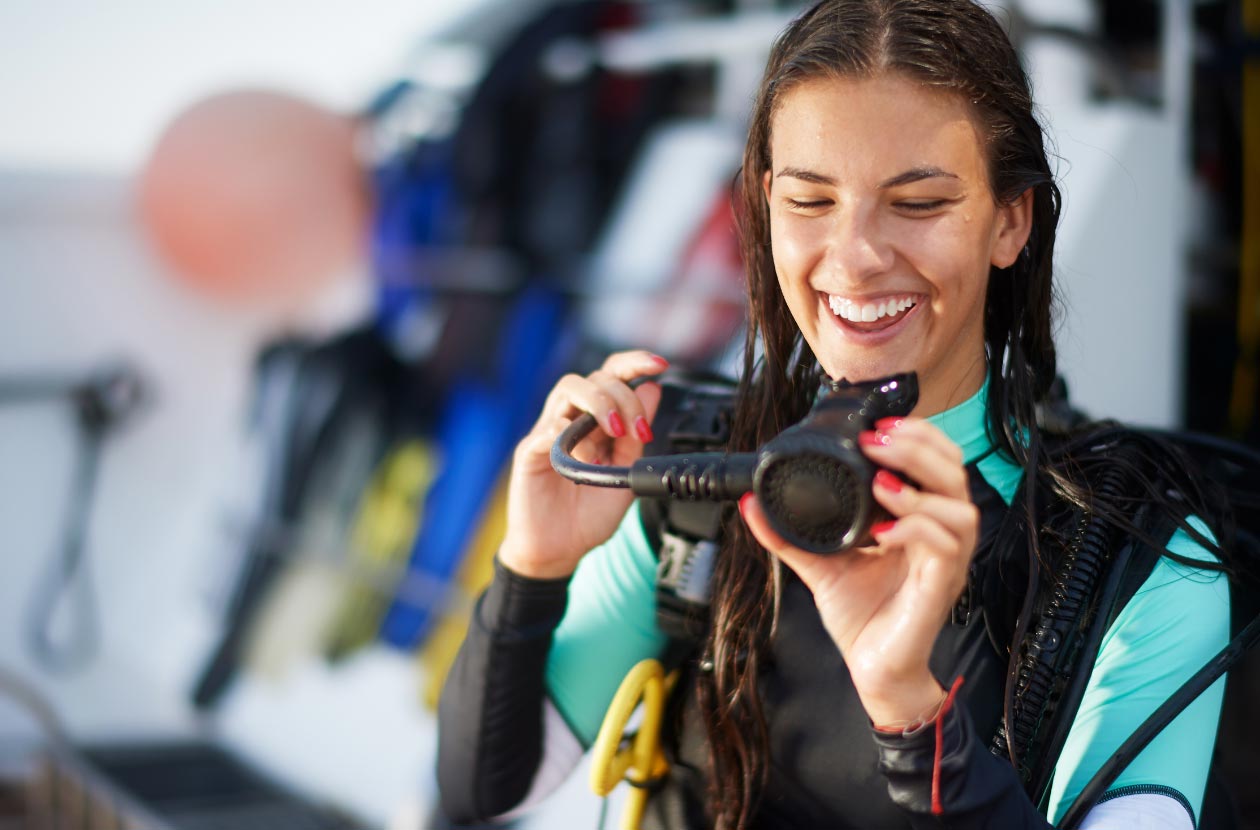
Especially during your first dives with implants, you may notice slight changes in buoyancy and trim, but it’s usually enough to get used to your new body element. Of course, the choice of dive gear is also important, and anything too tight, like wetsuits or BCDs, will not be the best idea.
Women may be more sensitive to cold
Yes, it is true that women can be more sensitive to low temperatures than men. This sensitivity can be influenced by various factors, including hormonal differences, body composition and metabolism. In colder conditions, women may feel the cold more quickly and require additional measures to maintain thermal comfort. It is important for female divers to choose appropriate exposure protection, such as thicker wetsuite or dry suits, and provide adequate insulation to prevent hypothermia and discomfort while diving.
It’s also always a good idea to change clothes and dry off as soon as possible after a dive, no matter where you dive. Believe me you can also get cold in the tropics….Women’s Health and Scuba Diving – let’s recap
I hope we have faced the challenge and prepared this text in a way that will help you clear up some doubts about women’s health and scuba diving. I always say and will continue to say that diving is for everyone and is not only a form of recreation, but simply a great adventure. There may still be statistically fewer women in diving than men, but this is not due to any contraindications. We invite all ladies to diving courses so that they can see the beauty of the underwater world.


